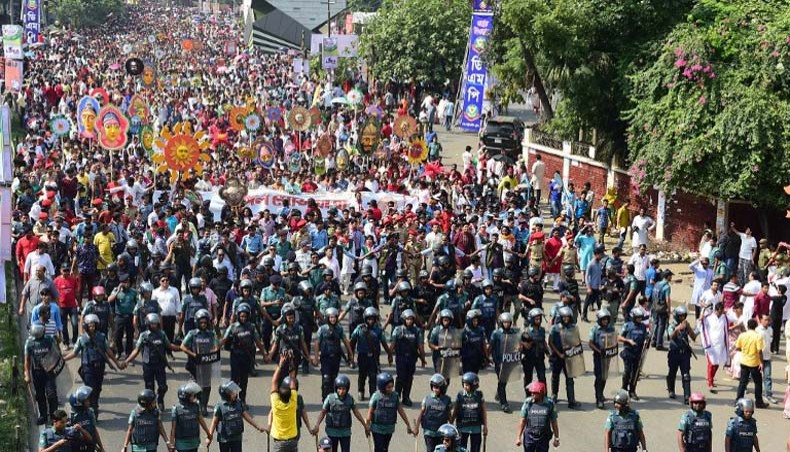Pahela Baishakh celebrated amid restrictions
The nation celebrated its most colourful and traditional festival Pahela Baishakh, the first day of Bangla New Year 1424, on Friday with much fanfare, festivity and enthusiasm amid restrictions.
As there were restrictions on outdoor programmes after 5:00pm, many were seen rushing to celebration venues in the capital from the morning. Many were, however, seen at different places of celebrations after 5:00pm, although no outdoor programmes were there.
As per the restrictions, nobody could enter Ramna Park and Suhrawardy Udyan after 4:00pm as all the outdoor programmes were rolled back in the two venues by 5:00pm.
Thousands of people thronged the streets and different popular places in the capital and elsewhere across the country as they welcomed the year with colourful processions, songs and fairs, beginning at dawn. Besides, businesses started the day with a new ledger, closing out the previous one.

Mangal Shobhajatra, a ceremonial walk organised on the first morning of Bangla New Year, Mangal Shobhajatra, with models of items marking culture and tradition parades streets in Dhaka on Friday. —Sanaul Haque
The day broke with the chirping of birds as usual, but the singing of ‘Esho hey Baishakh esho esho’ everywhere in Bangladesh gave the day a festive dimension.
Venues of celebrations in Dhaka such as Ramna Park, Suhrawardy Udyan, Dhaka University and Rabindra Sarabar and outside the capital were swarmed with people welcoming the new year.
In the capital, the day’s programme began with artistes of Chhayanaut rendering songs at Ramna Batamul at dawn. People in their hundreds gather at the venue amid heightened security. Cultural organisation Chhayanaut has been holding the music soiree there since 1965 and still remains the focal point of the celebrations.
Fine arts faculty of Dhaka University organised its ‘Mangal Shobhajatra’ following the Chhayanaut programme. People from all walks of life and ages carrying flutes, festoons and models traditional objects reflecting Bengali culture and heritage joined the procession seeking well-being of the nation.
Mangal Shovajartas (processions of good wishes) were also brought out at divisional, district and upazila levels to reach the traditional programme to grassroots as it earned the UNESCO recognition.
Men in traditional pajama and punjabi and women in white and red saris joined the celebrations along with children in colourful attires. They also relished Bengali delicacy of panta bhat (rice soaked in water).
The celebrations reached a peak in the afternoon with people in their thousands thronging different popular and historic spots in Dhaka and elsewhere.
Cultural organisation Surer Dhara and private television Channel i jointly organised a celebration programme at Bangabandhu International Conference Centre at dawn.

Artistes performs a traditional game of Bangladesh with sticks at Dhaka University’s Faculty of Arts, celebrating the first day of Bangla New Year or ‘Pahela Baishakh’ on Friday.— Sanaul Haque
The Ministry of Cultural Affairs, Bangla Academy, Shilpakala Academy, Sammilita Sangskritik Jote, Bangabandhu Sangskritik Jote, Bangladesh Shishu Academy, Jatiya Press Club, Dhaka Reporters’ Unity and different organisations celebrated the day with festivity in the capital.
Besides, Pahela Baishakh was also celebrated in Chittagong, Khulna, Rajshahi, Sylhet, Barisal, and Rangpur divisional headquarters, and other districts with fairs and cultural programmes, reported New Age correspondents.
President Abdul Hamid, prime minister Sheikh Hasina, Bangladesh Nationalist Party chairperson Khaleda Zia and leader of the opposition in parliament Raushan Ershad in separate messages greeted the nation on the occasion.
All public and private radio and televisions aired special programmes while newspapers published special supplements.
While Bengalis celebrate Pahela Baishakh, the hill communities in the Chittagong Hill Tracts held Baisabi celebrations at the same time.
On Baisabi, a term formed by the first syllables of Tripura festival Baisuk, Marma’s Sangrain and Chakma festival Biju or Tanchangya’s Bisu, people welcome the new year.
The day was a national holiday.
Important buildings and establishments as well as city streets and islands were illuminated with colourful lights and graffiti were painted in the walls signifying the arts, culture and heritage of the country.
Sammilita Sangskritik Jote organised solo and chorus folk music, dance and recitation of poems at Mirpur, Dania, Rayerbazar and different places in the capital city in the afternoon.
Bangla Academy staged cultural function and solo lecture at Rabindra-Chattar on the premises of the academy since 7:30am while a 10-day book fair titled ‘Baier Arang’ began marking the festival.
Bangladesh Small and Cottage Industries Corporation and Bangla Academy organised a 10-day Baishakhi fair on the academy premises.
Intensified security measure was ensured across the country including capital Dhaka to avert any untoward incident on Pahela Baishakh celebration.
Ramna Park and Suhrawardi Udyan areas were taken under complete CCTV surveillance while cops in uniform and in undercover were deployed in and around the function arenas including Ramna Park. Visitors entered the venue through archways and metal detector checking, witnesses said.
Watchtowers were installed in all the important places to monitor the movement of people.
The local administrations arranged procession, cultural functions, village fairs and discussions at the divisional, district and upazilla levels on the occasion.
Improved diets of Bengali food were distributed among the inmates of jails, hospitals and orphanages.
Cultural functions were also arranged at jails and orphanages across the country.
Bangladesh National Museum, Bangladesh Folk and Craft Arts Foundation, and archaeological sites under Department of Archaeology remained open for children, students and persons with disabilities to visit free of cost.
All educational institutions of the country including Rajshahi, Chittagong and Jahangirnagar universities also celebrated the day separately with enthusiasm and traditional gaiety.
- See more at: http://www.newagebd.net/article/13485/pahela-baishakh-celebrated-amid-restrictions#sthash.at5KaCCG.dpuf











